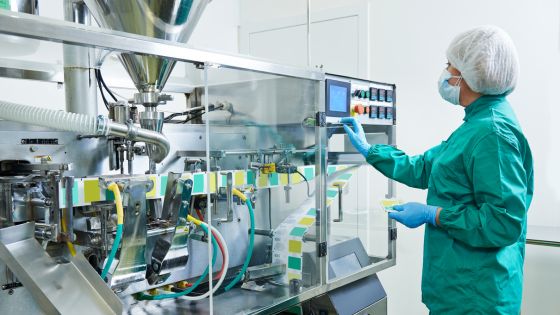Pharmaceutical manufacturing is a complex process that requires precision, accuracy, and efficiency. It involves the creation of drugs and medications through various chemical and biological processes. The use of advanced technology and vital tools are crucial in ensuring the safety, effectiveness, and quality of pharmaceutical products.


In this blog post, we will explore some of the essential tools used in pharmaceutical manufacturing and their importance in the production of safe and effective medications.
Importance of Vital Tools in Pharmaceutical Manufacturing
Pharmaceutical manufacturing involves a series of steps such as drug discovery, development, formulation, testing, packaging, and distribution. Each step requires specific tools and equipment to ensure the quality and safety of the final product. The use of vital tools in pharmaceutical manufacturing plays a crucial role in every stage of the process, and here’s why:
Quality Control
One of the primary reasons for using vital tools in pharmaceutical manufacturing is to maintain quality control. As medications are consumed by patients to treat various illnesses, it is crucial to ensure that they are safe and effective. The use of advanced tools such as spectrophotometers, chromatography systems, and dissolution testers helps in analyzing the chemical composition and purity of drugs. These tools provide accurate results, allowing manufacturers to identify any contaminants or impurities that may affect the quality of the product.
Accuracy and Precision
Pharmaceutical manufacturing requires precise measurements and calculations as even a slight error can have a significant impact on the final product. Vital tools such as pipettes, burettes, and balances are essential in ensuring accuracy and precision during formulation and dosage preparation. These tools are calibrated regularly to maintain their accuracy, and their proper use is crucial in producing safe and effective medications.
Efficiency
Efficiency is another critical factor in pharmaceutical manufacturing as it directly impacts the production time and cost of medications. The use of automation tools such as robotics, high-speed fillers, and labelers helps streamline the manufacturing process and increase efficiency. These tools can perform repetitive tasks with minimal errors, reducing the risk of contamination and ensuring consistent product quality.
Safety
The use of vital tools in pharmaceutical manufacturing not only ensures the safety and effectiveness of medications but also protects the health and well-being of employees. The production of drugs involves handling hazardous chemicals and substances that could be harmful if not handled properly. Tools such as fume hoods, safety cabinets, and personal protective equipment (PPE) are essential in providing a safe working environment for pharmaceutical manufacturing workers.
Compliance with Regulations
Pharmaceutical manufacturing is a highly regulated industry, and manufacturers must comply with strict regulations to ensure the quality and safety of their products. The use of vital tools such as data loggers and environmental monitoring systems helps in monitoring and recording critical parameters such as temperature, humidity, and air quality. These tools provide evidence of compliance with regulations, ensuring that pharmaceutical products meet the required standards.
Essential Tools in Pharmaceutical Manufacturing
Now that we have understood the importance of vital tools in pharmaceutical manufacturing, let’s take a closer look at some of the essential tools used in this industry:
Mixing and Blending Equipment
Mixing and blending are crucial steps in the production of pharmaceutical products, as it ensures even distribution of ingredients. Tools such as high-shear mixers, tumble blenders, and fluid bed dryers are commonly used for mixing and blending powders, granules, and liquids.
Tablet Presses
Tablet presses are essential for shaping powdered ingredients into precise forms like tablets and capsules, ensuring consistent dosing and dissolution rates. Some materials can’t be used due to conductivity issues. Non-conductive thermoplastic hoses are specially designed to suit these machines. Their unique properties ensure stability, reliability, and high-quality product outcomes.
Packaging Equipment
Pharmaceutical products must be properly packaged to ensure their stability, efficacy, and safety. Tools such as blister packaging machines, bottle fillers, and capping machines are used to package medications in various forms such as tablets, capsules, and injectables.
Analytical Instruments
Analytical instruments play a crucial role in the quality control and testing of pharmaceutical products. Tools such as HPLC systems, mass spectrometers, and UV spectrophotometers help in analyzing the chemical composition, purity, and potency of drugs.
Sterilization Equipment
Sterilization is an essential process in pharmaceutical manufacturing to ensure the safety of medications. Tools such as autoclaves, dry heat sterilizers, and depyrogenation ovens are used to eliminate microbial contamination from equipment and packaging materials.
Conclusion
The use of vital tools in pharmaceutical manufacturing is crucial in ensuring the quality, safety, and effectiveness of medications. These tools not only help in maintaining quality control and compliance with regulations but also improve efficiency, accuracy, and employee safety. With the advancement of technology, we can expect to see more advanced tools being used in pharmaceutical manufacturing, further enhancing the production of safe and effective medications for patients worldwide. So always prioritize the use of vital tools in pharmaceutical manufacturing for better results!


























